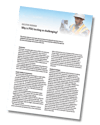
Event overview
This exclusive roundtable event hosts experienced industry leaders in the PFAS analytical testing field to share their own experiences and discuss various topics that will help empower PFAS analytical testing laboratories to future-proof themselves, in this constantly evolving area of environmental concern. Topics covered include:
- The current landscape, market trends and future state of PFAS analysis
- Review of current and emerging US and EU regulatory requirements for PFAS analytical testing
- Analytical technologies to help tackle PFAS testing projects of any size or scope, faster
 Plus Download the Executive Overview
Plus Download the Executive Overview
The 'Executive Overview' is also available when registering for the on-demand presentation. This provides a detailed summary of the presentation with accompanying figures and tables.
What you need to know:
Format: On-demand
Duration: Approximately 60 mins
Expert Panellists: Lee Ferguson (Duke University, North Carolina, USA)
Lee Ferguson (Duke University, North Carolina, USA)
Dr P. Lee Ferguson is an Associate Professor of Environmental Science and Engineering at Duke University in Durham, NC, USA. He received B.S. degrees from the University of South Carolina in Chemistry and Marine Science in 1997 before earning a Ph.D. in Coastal Oceanography at State University of New York – Stony Brook in 2002. His postdoctoral research was conducted in the area of proteomics at the Pacific Northwest National Laboratory in Richland, WA, USA. Before joining Duke, Dr. Ferguson was an Assistant and Associate Professor of Chemistry at the University of South Carolina.
 John Quick (ALS Environmental, UK)
John Quick (ALS Environmental, UK)
John Quick is the principal scientist at ALS Environmental in Coventry. John’s background is in chromatography and over the last years John and his team have developed methods to analyse all the compounds included in the CIP program (A UK version of the Water Framework Directive) with detection levels not seen by any other commercial laboratory in the past.
 Vladimir Nikiforov (NILU-Norwegian Institute for Air Research)
Vladimir Nikiforov (NILU-Norwegian Institute for Air Research)
Dr Vladimir Nikiforov graduated from St. Petersburg State University in 1986, got a degree in 1990 (Synthesis of fluoroketones for extraction of anions) and continued with the same university doing research and teaching in Synthetic organic, Physical organic, Environmental chemistry until 2010. From 2010 to 2014 he was a head of laboratory of migration of POPs in the Center of Ecological Safety of the Russian Academy of Sciences and then joined NILU-Norwegian Institute for Air Research. His current research interests include PFAS and other organofluorines, Non-target and suspect screening, QSAR, development of analytical methods for new pollutants and microplastics in all matrices, and in air samples in particular.
 Christopher P. Higgins (Colorado School of Mines)
Christopher P. Higgins (Colorado School of Mines)
Christopher P. Higgins is an environmental chemist at the Colorado School of Mines. Dr. Higgins’ received his A.B. in Chemistry from Harvard University, and graduate degrees in Civil and Environmental Engineering from Stanford University. He joined Mines in 2009, attaining the title of University Distinguished Professor in 2022. His research focuses on the movement of contaminants in the environment. In particular, he studies chemical fate and transport in natural and engineered systems, with a focus on poly- and perfluoroalkyl substances (PFASs). Dr. Higgins has authored more than 135 peer-reviewed publications. His research has been supported by NSF, NIH, EPA, USDA, and the DoD.
 Ed George (Thermo Fisher Scientific)
Ed George (Thermo Fisher Scientific)
Ed George has a BS in Chemistry from the University of Notre Dame with concentration in Environmental Science. He worked for 15 years in the environmental laboratory industry, holding positions of Lab Technician, Lab Manager, and R&D Manager, responsible for developing novel sample preparation and analytical methods in soil and water on GC/MS/MS and LC-MS/MS platforms. He participated in several collaborative method development projects with the USEPA. In 2014, he joined Thermo Fisher Scientific and is currently a Senior Applications Scientist. He has worked closely with key collaborators on food safety and environmental projects in universities and industry and has recently developed workflow applications for pesticide and veterinary drug residues in food on both LC-MS/MS and high-resolution MS platforms.
Who should watch:
- Environmental analytical testing laboratory leaders
- Lab technicians, lab managers, lab directors
Sponsor:

